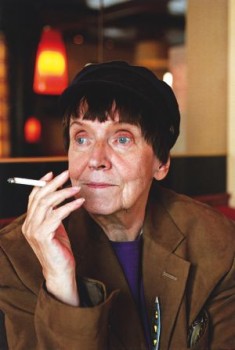On Mirkka Rekola
Issue 2/1978 | Archives online, Authors

Mirkka Rekola. Photo: Elina Laukkarinen/WSOY
The very title of Mirkka Rekola‘s latest collection of poems, Kohtaamispaikka vuosi (‘Meetingplace the year’, Werner Söderström, 1977), reveals a theme central to Rekola’s poetry: that of unity. The time is the place. ‘I do not imagine I shall meet you this year. / This place will be here in summer.’ Rekola has a particular way of using language of the most intense concentration, so that it brings out unity between a wide variety of moods. ‘I shall meet you this year’ also means that you are this year. ‘This place will be here in the summer’ means that it is autumn and this place (a summer café) will remain deserted until the summer, but also that this place will remain there as the summer.
‘The world, a table already laid, there you see your hunger.’ ‘At the same time a little thirsty and a cowberry.‘ The correspondence of place, the synchrony of season and the general sense of undividedness produce countless pictorial and therefore concrete expressions throughout Rekola’s poetry. ‘I spread my hands / and someone yawned, / I held my fingertips in the breeze / and the boats slid into the water.’ ‘The child said to the old man: you are bent, while I am so little.’ ‘A shout is heard which is no other’s.’ Rekola’s concrete and graphical mode of expression is also based on the same philosophy: ‘Do not make a picture, everything is [a picture]’. ‘The sun, star of the night, introduces the day. And the world is so talkative in its dreams.’
‘He who makes space is a gateway.’ The open gateway is an important image in this collection, as is obvious from the fact that it appears in three of the poems translated below. ‘The gateway is so open towards me / that there is no one inside.’ When the gateway is fully open, there can be no one there. The vision of a person at the gate is a mystical vision. Indeed, Rekola is fundamentally a mystic, who frequently produces surprising associations by means of a paradox: ‘its springtime is day to day, night to night, / it is always so different.’ In this same poem (No. 5 below) Rekola uses the homonym teillä to great effect (kansoitettuna kaikilla teillä in lines 6 and 7): it means both ‘on roads’ and the second person plural of the personal pronoun, i.e. ‘by you’ – thus people are also ‘roads’. In the poem ‘I twist it, I give it meaning’ (No. 7), the purchaser of the ring twists it ilman aikojani (line 18), which in normal usage means ‘idly, absent-mindedly’, but has the literal meaning of ‘without my times’. And the ring in the poem is open, just like the year, and its gateways.
The inseparability of life and death is also apparent in this view of unity. Someone is walking along a path from a chapel of rest (No. 5), someone who is a child again, and some people come towards him; they and the whole town are reflected in his eyes and they all come from that place. Mirkka Rekola’s poetry presents great difficulties for the translator, as is generally the case when a poet makes the fullest possible use of the semantic range of a language. Rekola’s poetry has also proved difficult for critics. The emotive power and liveliness of her language make it impossible to translate her verse into clear concepts and the many meanings hiding in simple everyday language are often as difficult to make out as the transformation tables in a psychology textbook. Like Paavo Haavikko, Rekola has the reputation of being a ‘difficult’ poet.
Mirkka Rekola (born 1931) published her first collection of poems, Vedessä palaa (‘Burning in the water’, Werner Söderström) in 1954. Her view of the tension and polarity in the world is already apparent from the title. This first volume and her next, Tunnit (‘The hours’, Werner Söderström, 1957), were for the most part a tightly controlled and voluntary personal statement, although it was already clear that her sharp and independent image-thought was breaking away from traditional lyric poetry. The dualism of the ego and the world finds expression in her collection Syksy muuttaa linnut (‘Autumn changes the birds’, Werner Söderström, 1961); the two which followed, Ilo ja epäsymmetria (Joy and asymmetry’, Weilin + Göös, 1965) and Anna päivän olla kaikki (‘Let the day be all’, Weilin + Göös, 1968), marked the beginning of her mature period, which placed her among those poets of the first rank who were breathing new strength into language and thought. Her three most recent collections, Minä rakastan sinua, mina sanon sen kaikille (‘I love you, I shall tell everyone’, Werner Söderström, 1972), Tuulen viime vuosi (‘The last year of the wind’, Werner Söderström, 1974) and Kohtaamispaikka vuosi demonstrate her consistent and still-growing creative powers. In her two collections of aphorisms, Muistikirja (‘Notebook’, Werner Söderström, 1969) and Maailmat lumen vesistöissä (‘The worlds in the waters of the snows’, Werner Söderström, 1978), Rekola has revived this genre of Finnish literature, giving it a greater sense of space and movement. An aphorism by Rekola is a flash of thought born of an unexpected juxtaposition of words and their many layers of meaning.
Translated by Susan H. Reynolds
No comments for this entry yet
Leave a comment
-
About the writer
Mirjam Polkunen (1926–2012) was a major figure in the Finnish literary scene. She worked as an arts journalist for YLE, Finland’s public service broadcaster, and as a dramaturge for nearly a quarter century. She also edited poetry and prose. Mirjam Polkunen began her literary career as a poet.
© Writers and translators. Anyone wishing to make use of material published on this website should apply to the Editors.
